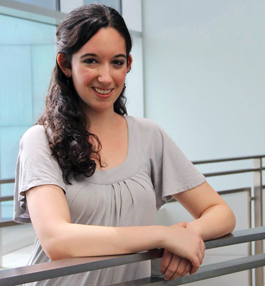Destination: Access for All

Alexandra Zelle Rettman
Madeline List '15
by Samantha Lawsky
Ten weeks. Eight countries. Five continents. One student.
Last summer, Madeline List ’15 packed her bags for the journey of a lifetime, with a serious goal in mind: researching ways to make the world navigable, safe and accommodating for people with disabilities (PWDs).
List traveled solo to Brazil, Argentina, Australia, Singapore, Malaysia, South Africa, Israel and Sweden to discover how PWDs in those countries are accommodated — or not. Ultimately, she hopes her findings will be adapted into cost-effective, practical policies that improve lives around the globe.
The motivation for List’s research came from a very personal place: She was born legally blind in one eye. Funding came from a travel-study grant program run by the Circumnavigators Club Foundation. Brandeis is the first Boston-area school to offer these grants, thanks to the efforts of Bruce Magid, P’15, dean of Brandeis International Business School. In 1972, Magid was the second-ever recipient of the same grant List earned four decades later.
A few weeks after her return, List reflected on what she learned during her epic travels.
What surprised you most as you conducted your research?
I was surprised by how many factors contribute to a state of disability. Without good accessibility standards, people can’t get to school, and won’t be qualified to get a good job and support themselves. Without good health care, PWDs might not be able to go to school or work. If a PWD’s family isn’t educated, they might not know how to access good health care. And if people aren’t healthy enough to get out of the house to study or work, then it’s hard to raise public awareness. There are many vicious cycles going on here, and they all need to be addressed to make things better.
The challenge sounds daunting.
Well, the good news is there has been a lot of progress. In almost every country I visited, people would mention that PWDs are becoming more active in their community. Awareness among government officials and the public is increasing. There’s still a long way to go, and in some countries you would be shocked by what the “improved” standards are, but we’re inching forward. Many countries are in the early stages of rolling out new schemes and services.
Is there an obstacle to access that you see again and again around the world?
Paving is important. Relatively speaking, the U.S. doesn’t have many cobbled or bumpy sidewalks, but I saw plenty in South America and Europe, and I heard about the very serious injuries that can happen when people with assistive walking devices try to navigate nonlevel ground.
Does any country seem ahead of the curve in thinking about access?
I was impressed by Sweden’s accessibility standards. To get to the underground trains in Stockholm, you enter and exit on opposite sides of the elevator, so if you’re in a wheelchair you don’t need to go in backward or swivel around to leave the elevator. When I was in New York after my trip, I was frustrated the subway elevators weren’t more like Stockholm’s.
What are some of the other interesting initiatives you found?
There’s an incredible sports and job-training facility for people with disabilities in Rio, and a low-cost wheelchair factory in South Africa that’s become a multinational organization.
Some of my best findings came from cross-comparison. In Singapore, people expressed concern over improper care of PWDs by public-transportation employees. In Israel, I found an organization that addressed the same concern by creating a training workshop for bus drivers.
What is the biggest understanding you hope people take away from your research?
Accommodations and accessibility for PWDs is an issue that transcends all nationalities and economic classes, and all citizens have to play their part. If you’re in a packed elevator and see someone in a wheelchair looking for room, take action. If you see an unshoveled building ramp after it snows, do something. These measures take only a little time and effort, but they create a noticeably different experience.
